Can 5G Really Bring Down an Airplane?
How the 5G rollout grounded hundreds of flights—and how to fix it
How the 5G rollout grounded hundreds of flights—and how to fix it
Professor David Blei, with co-authors Matthew Hoffman and Francis Bach, is recognized with a Test of Time Award at NeurIPS, the world’s top machine learning conference, for scaling his topic modeling algorithm to billions of documents.
Teaching AI to distinguish between causation and correlation would be a game changer— well, the game may be about to change.
The Society for the Advancement of Economic Theory named economic theory fellows who have substantially advanced economic theory through scholarly and creative achievement.
It is one thing to study and learn about artificial intelligence in class and it is another to experience it and learn from doing it.
Girls’ Science Day was recently held and the day-long event introduced middle school girls to experiments and activities to show them how interesting and fun science can be for young women.
Ansaf Salleb-Aouissi knows how important it is to include women’s voices in science and research. She first became interested in computer science and coding when she was 14 after she joined an after-school program, near her house, and quickly realized that she would like to become a computer scientist. She achieved her dream when earned an engineering degree in computer science at the University Of Science And Technology Houari Boumediene (USTHB) in Algiers, Algeria, her home country.
Salleb-Aouissi was the only girl in the after-school computer science class, and later only a small number of women (less than 10 percent) of the class were women at her university.
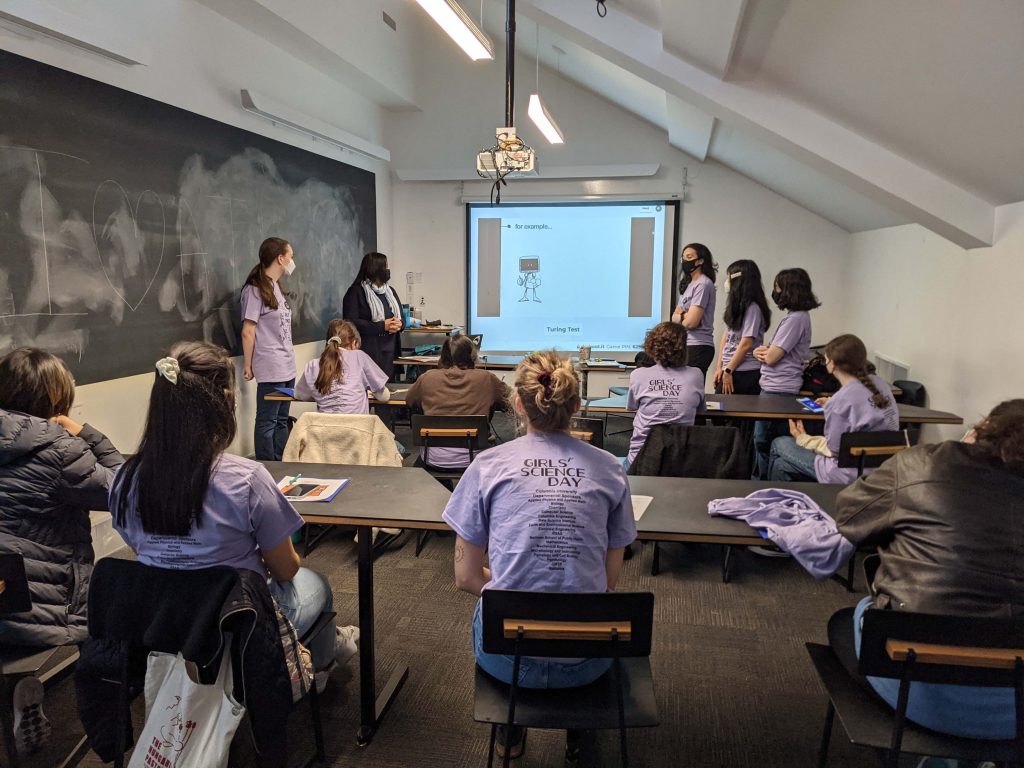
As a mother of two middle-school-age daughters, she immediately volunteered to host two sessions to introduce artificial intelligence to students. Her projects in AI and education for pre-college students helped her prepare for the class. But this time around she tailored the lesson and broke down the concepts so that it would be easier for the teens to understand.
Nowadays, teens are immersed in AI, whether they know it or not, so showing them examples to explain the concepts was the perfect way of sparking interest and connecting science to their everyday lives.

Aside from gamifying the lesson with help of the online Kahoot platform, the students experienced training a model to identify objects. This is where the fun began, the students were tasked to teach the model how to identify the human body. To do this, they posed for the camera and had to think of different poses to help the model learn. A second experiment taught the model how to identify a purple pen and a green toy car. The students had to take pictures from various angles to be able to generalize and predict future images.
Once the model analyzed the photos it could easily identify the purple pen and could even identify a red and blue pen. The students were impressed by how the model worked well in identifying different objects from just a small set of sample photos.

Salleb-Aouissi joined the department in 2015 as a Senior Lecturer and does research in machine learning and medical informatics (e.g., prediction of premature birth), as well as building tools to help her students write proofs using propositional logic. This semester she is teaching discrete mathematics (COMS W3203) and is advising graduate and undergraduate students working on research projects.
Introduction to Artificial Intelligence and Kahoot materials by Ansaf Salleb-Aouissi, Uzay Macar, and Noah Mauchly (animator).
PhD student Mia Chiquier’s research is featured in Science. The new technology, called Neural Voice Camouflage, disguises words with custom noise.
The department is extremely proud of all of our students and would like to honor this year’s graduates! We were happy to have graduation celebrations in-person this year. Nothing beats the energy and excitement of commencement day!
During Class Day, awards were given to students who excelled in academics, students with independent research projects, and to those with outstanding performance in teaching and services to the department. The list of CS awardees is in this year’s graduation handout.
This year two new department awards were introduced, the Behring Foundation Award and the Davide Giri Memorial Prize. The Behring Foundation Award is given to excellent CS students who have lived, worked, or studied in Brazil or other Latin American countries.
The Davide Giri Memorial Prize will be awarded annually to a graduate student in Computer Science who has combined excellence in research results with continued outstanding efforts to promote research collaboration. The prize was established in memory of Davide Giri (PhD ’22), who promoted research collaboration in an exemplary way as part of his doctoral studies while excelling as a researcher.
The CS department gave out the awards to graduates after the University’s commencement ceremony. Below are photos from the department’s graduation celebration.
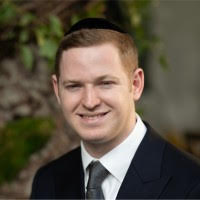
Jakob Gabriel Deutsch
Salutatorian, BS Finance and Business Analytics, Sy Syms School of Business of Yeshiva University 2020
For me, the MS Bridge program has been a great experience. Coming from a finance background with minimal experience with programming, the bridge portion of the program really gave me the necessary skills and experience to succeed in the MS portion of the program. Not only did the program bring me up to speed with other students, but the MS portion really exposed me to the various areas within the field of computer science and enabled me to explore those different disciplines.
When I started the program I wasn’t sure which track I wanted to pursue. After taking a couple of courses and seeing which ones matched best with my interest and strengths, I decided to pursue the Software Systems track. My favorite part of the program was probably a course that I took in my final semester, Advanced Database Systems with Professor Luis Gravano. It was a great class in which we learned about a variety of information extraction techniques and had the opportunity to implement a number of them ourselves as assigned projects. Professor Gravano was great and the course really bridged the gap between theory and application which is something you do not always get to see in the context of a single course.
During the summer I had the opportunity to intern for Prudential Financial as a Software Engineering Intern. There, I was able to continue building my programming skills in a more hands-on setting.
Having completed the MS program, I am confident that I have the skills necessary to be successful in any computer science related position. At the end of the summer, I will start full-time work at American Express as a Software Engineer in their New York office.
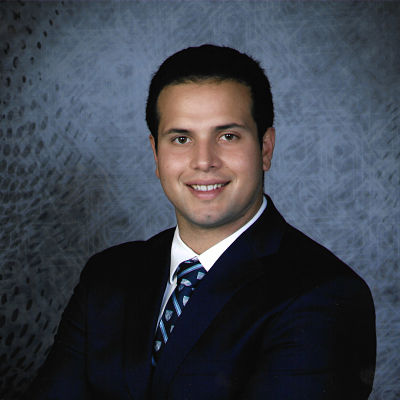
Matthew Maximino Duran
BA Economics and Mathematics, School of General Studies of Columbia University 2020
Former 3B with the New York Yankees
The program has been wonderful and it met all of my expectations. I was able to move through it at my own pace and was fully prepared for all of the master’s level coursework that I encountered. It was really important to me to not just become fluent in coding but to learn the fundamentals that underpin all of computer science. Through the Bridge classes and the master’s core, I have set the foundation for future learning as technologies change.
The MS Bridge program allowed me to get up to speed and prepare myself to thrive in the challenging master’s classes. That mission definitely succeeded, I never not once felt unprepared in any of the classes that I took in the MS portion of the program.
My favorite course was Advanced Databases with Professor Luis Gravano. In that class, we learned how the modern internet works, from web search and data mining to information retrieval and extraction. Overall, he was one of the most engaging and prepared professors that I had.
I started the program wanting to study Software Systems and I followed through on that goal. I felt that the Systems track afforded me the greatest flexibility in future career options, and for me personally, it was a “need to have.” Had I studied computer science in undergrad, then I could have potentially done Machine Learning or a different track. The systems track was very well planned and allowed me to touch all facets of modern computing from low-level hardware to the cloud. Overall, I am very thrilled with how everything turned out.
I did not do an internship during the program, one of my biggest regrets. I took summer classes with the hopes of accelerating my progress through the program. Maybe as this program takes off, there will be companies willing to partner with MS Bridge students, who have much less practical work experience than their peers.
After the program, I begin my software engineering career with American Express in New York City. I am really excited to see the types of projects that I will be working on, and how all of my foundational knowledge can be applied to real-world projects.
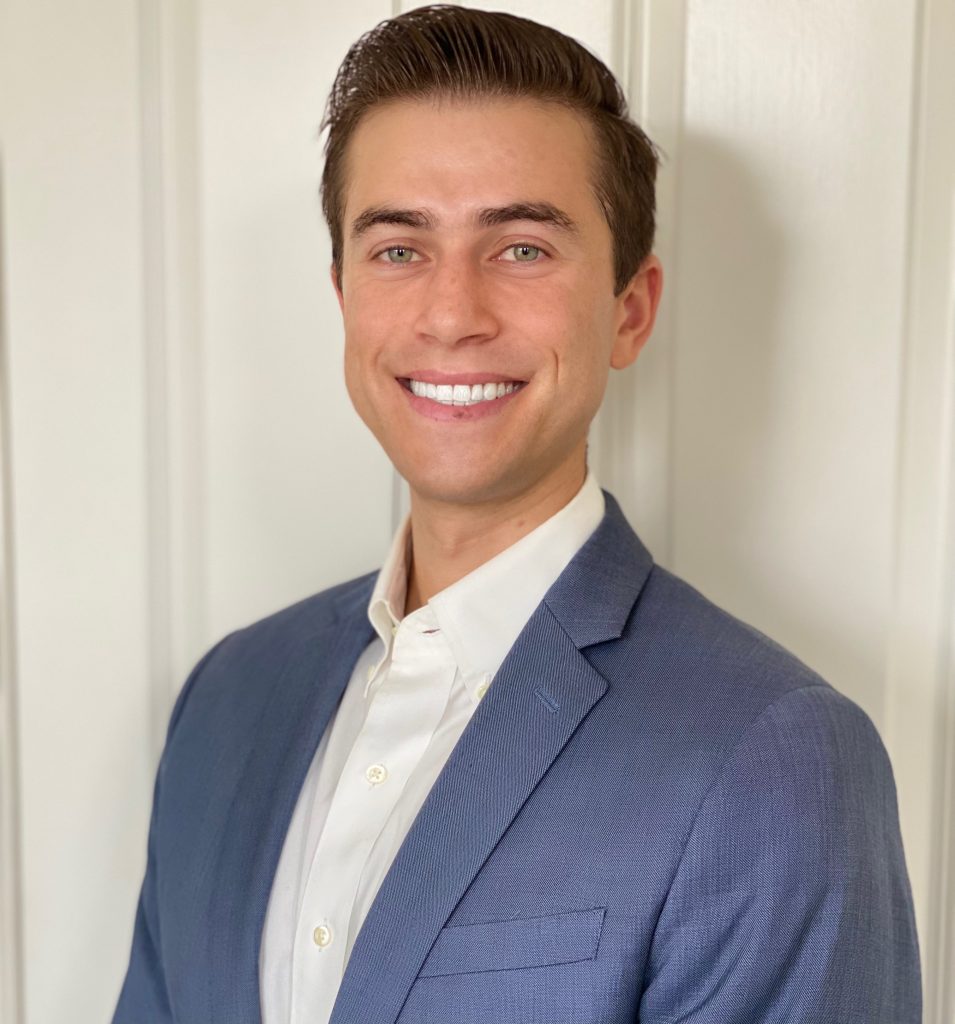
Ethan P Garry
BA Mathematics and Statistics, University of Rochester 2016
Associate of the Society of Actuaries in 2019
I loved the MS Bridge program! The program absolutely exceeded expectations. I might be lucky, but I 100% fell in love with coding, technology, and building systems. Now I am very confident in my tech skills, to the point where project partners are frequently impressed with my practical knowledge.
I started with software systems, then graphics, and ultimately made a personalized track (that I highly recommend for anyone looking for practical experience). Compared with friends who went with systems, they learned excellent skills and have great knowledge of systems, but lack certain high-level, real-world project building expertise.
Intro to Databases/Cloud Computing with Professor Donald Ferguson and User Interface Design/Advanced Web Design with Assistant Professor Lydia Chilton were my favorite classes. Both professors are incredibly passionate about teaching in their own unique way. These two professors were the best I have had in my entire educational career.
I was also able to do an internship where I worked with the Columbia Build Lab. This is another experience I highly recommend – it was very much like being thrown into the sea, but it forces you to learn so many practical concepts. You will be incredibly prepared for anything that comes next.
After graduation, I’ll be working as a Software Development Engineer at Amazon in their Physical Stores office in Seattle.
It’s a Friday night at International House and the graduate student residents of the dormitory are gathered to watch Central do Brasil. Andrea Clark-Sevilla is among them and looks forward to immersing herself in the touching story about friendship and finding one’s greater purpose. It is a much-needed break from the busy last semester of her master’s degree.
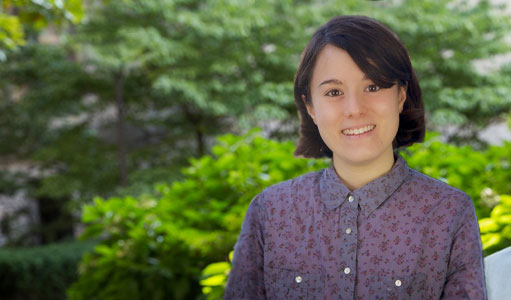 The past two years have been non-stop for Clark even though she started her graduate career in 2020 at the height of the pandemic. Although she was fully remote, living in Querétaro, Mexico during her first year, she managed to pack in a research project with Senior Lecturer Ansaf Salleb-Aouissi and win a National Institutes of Health contest for it.
The past two years have been non-stop for Clark even though she started her graduate career in 2020 at the height of the pandemic. Although she was fully remote, living in Querétaro, Mexico during her first year, she managed to pack in a research project with Senior Lecturer Ansaf Salleb-Aouissi and win a National Institutes of Health contest for it.
The Decoding Maternal Morbidity Data Challenge aims to promote and advance research on pregnancy and maternal health. For the challenge, the team looked at data from the Nulliparous Pregnancy Outcomes Study: Monitoring Mothers-to-be (nuMoM2b) and decided to focus on preeclampsia, a pregnancy complication tied to high blood pressure that could lead to maternal and infant death if left untreated. Together with colleagues from Hunter College, their research, On Predicting and Understanding Preeclampsia: A Machine Learning Approach, developed a machine learning model that can predict women at risk of developing preeclampsia.
This was Clark’s first research project and being part of it helped her decide to pursue a PhD. Clark shared that she looked at the opportunity to use the two-year master’s program to explore and see if a research career is for her. “There are so many different ways to do research and chances to do other interesting things at Columbia, that I was hooked!” said Clark, she will begin her PhD in the fall and continue working with Salleb-Aouissi. “I now know for sure that I want to become a researcher and I am looking forward to starting my PhD.”
While many think that having to do meetings over Zoom and not being able to work and collaborate in person is a hindrance to good work, the opposite is true for Clark. Over the summer, she was able to do an internship with the Johns Hopkins University Applied Physics Laboratory (APL) and volunteered as a student instructor at Columbia’s AI4All summer program for high school students, where she was invited by Professor Augustin Chaintreau to lead a class on machine learning. So while doing research remotely from El Paso, Texas she would jump onto Zoom sessions with the AI4All students who were in New York City. Clark admitted she would not have been able to do both if things were in person.
When she isn’t brushing up on her French and German skills or watching a foreign film or two, Clark is working on her final projects and schoolwork and attending meetings to write the research paper for the preeclampsia project. We sat down with Clark to find out more about how she decided to pursue a PhD and her new love of research.
Q: Did you always want to do research and how did you start working with Professor Ansaf Salleb-Aouissi?
I studied math as an undergrad at Cornell, and it was not until rather late in my program that I found out what application field really interested me research-wise. I took a course in dynamical systems and biology, and it was after this that I found that I was passionate about combining biology and computing.
I actually found Professor Salleb-Aouissi through her wonderful and engaging edX course on Artificial Intelligence. After looking into her research areas, I was absolutely convinced that I wanted to work with her and applied to Columbia hoping to get a chance to collaborate with her in some capacity. It was so incredibly fortunate that it happened to work out that she was looking for students to work on a project during my second semester in the program!
Q: What did you work on and what did you like about the research?
I have mostly worked with evaluating different existing methods for interpreting traditional black-box machine learning models. For the NIH challenge, I leveraged a method called Partial Dependence Plots (PDPs) to determine which feature(s) had the greatest marginal contribution to a model we trained for predicting the incidence of preeclampsia in pregnant women. Using this method, we were able to narrow the cut-off points for high-risk factors, such as body mass index (BMI), blood pressure, and some notable placental analytes (proteins and/or hormones generated by the placenta) and show their influence on the model’s ability to predict the incidence of preeclampsia.
This can be useful information to clinicians who wish to monitor their patients based on a more curated set of risk factors and critical ranges for these, as well as organizations such as the American College of Obstetricians and Gynecologists (ACOG) who largely set the guidelines for this medical evaluation. Drafting appropriate guiding criteria for such a potentially dangerous condition has the potential to save many women.
Q: What are you working on now?
We are currently preparing the paper related to the NIH challenge for publication. Our team that worked on this challenge had so many great ideas, and the paper is slowly but surely evolving to its final form. The challenge itself felt rather short-lived, given how rich the data is and the different angles to approach the problem, depending on how one defines preeclampsia, for instance. All these details need to be properly addressed and defended, which takes much time. I am also finishing up my course requirements to graduate.
Q: Why did you decide to get a master’s degree instead of applying for a PhD?
For me, it was very important to figure out if I was suited to doing research before committing to a five-year program in which I would be doing this exclusively. I have heard stories about students dropping out of their PhD programs because it was not what they were thinking they signed up for. I don’t think the traditional undergraduate curriculum adequately prepares one for research, or at least it was not the case for me.
Q: What do you think people should know about doing a master’s degree? If you didn’t go through the program would you have applied for a PhD program?
A master’s degree is a great option if your undergraduate degree is not well-aligned with your career objectives, as it can give you the opportunity to pivot your skillset accordingly. I would say my experience is not the normal use-case for it, as I purely pursued the master’s degree to decide if I enjoyed doing research and could see myself continuing in a PhD program. If I did not enjoy it at all, two years is not a lot of sacrifice career-wise, and it is certainly a good learning experience.
The same cannot be said for a PhD program. I personally would not have had the confidence to commit to a PhD program not having the research experience I had with Professor Salleb-Aouissi. It is a bit of a double risk with a PhD program. First, you need to be reasonably committed to your research topic, and second, and I think most importantly, you need to be confident that you can work well with your advisor.
I feel that many students go into a PhD blindly, straight after undergrad. I am extremely fortunate to be able to say that I am very confident about both thanks to my experience in the master’s program.
I was also lucky enough to win a National GEM Consortium Fellowship for the master’s program. The fellowship allowed me to focus primarily on my research and not have to worry about the financial aspects of being in the program. I was also awarded this fellowship to continue funding my PhD studies.
Q: Why did you decide to apply for a PhD?
I feel that I am very driven when I have control over the questions that I want to answer and I have the freedom to explore them in the ways I see fit. I think that the most suited profession for someone with these characteristics is research.
Doing a PhD gives you the freedom to live in your own little world for five years and come out an expert in what you are passionate about. It’s really a dream situation!
Q: What will be your research focus?
I will continue my research on explainable artificial intelligence, likely in the precision medicine field. I also hope to be able to dig more into the theoretical underpinnings of more statistics-driven approaches and develop my own approaches for interpreting machine learning models.
Q: What sort of research questions or issues do you hope to answer?
I would like to bring the issue of creating explainable AI more to the forefront in the machine learning community. I feel that there is a lot more focus on developing the most state-of-the-art models in terms of predictive performance, but there is not enough research being done to make the results of such models understandable to the end-user, which might very well have serious social impacts.
Q: What is your advice to students on how to navigate their time at Columbia? If they want to do research what should they know or do to prepare?
I think students should take classes that truly interest them, and if possible, also explore courses in other related departments. I have a friend who is taking a project-based course combining data science and climate change, and he is learning so much from it and enjoying it greatly!
I personally think that the best incarnation of learning comes from working on a tangible project like that and having the space to try ideas and explore. That is how it started with me and Professor Salleb-Aouissi.
Q: Is there anything else that you think people should know?
Don’t be afraid to fail at something at first! I always felt pressured to get something right on the first attempt, and I quickly realized that this mentality is not sustainable in the long run if you do research.
You learn so much more from your mistakes than from your successes. Your critical thinking skills are actively engaged when you have to analyze why something failed as compared to when it happily worked on the first try. I would hazard to say that researchers are skilled puzzlers because they always manage to pick up the pieces when something breaks.